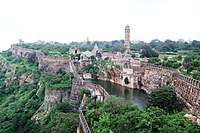Dawpruva
A Dawpruva is the name of a type of mountainous fort constructed between the late antique era in Tusing all the way up until the annexation of Tusing in 1880. While construction styles differ by region and era of construction, the general principle of the Dawpruva remained constant throughout its employment. Dawpruva were constructed by minor nobles to guard key mountain passes between the Minghua valley and the Great Steppe, eventually spreading to the valley's southern borders with Xiaodong as well. Following the Peshkal migration and establishment of Peshkal control over the Minghua region the Dawpruva were forced to pay a tithe in turn to the Khan, leading to the establishment of the North Minghua Confederation as a loose military alliance of Dawpruva which resisted the Peshkals. The defeat of the Peshkal Khanate in the tenth century led to the ascendancy of this confederation in the northern passes, with a similar system growing in the southern passes. Despite their nominal statehood, the confederations served as loose military alliances and had very little central control. The Dawpruva lost relevance with the weakening of cross-mountain trade, and their last vestiges were eventually crushed by the Xiaodongese in 1880.
The function of the Dawpruva was simple. The Tsudaw, or Mountain Prince, would extract income from tithes levied on merchants and other travellers through their pass in the form of a Writ of Passage, and in return provide protection from banditry. These dawpruva soon became home to monastic and scholastic communities as well, providing a safe place for such institutions to establish themselves. Similar to the castle of Euclean feudalism as opposed to the Sares of Bahian Hourege or Terengauni Bentengs, the Dawpruva did not host a large civilian population and fulfilled a role that was almost purely military. There was no system of tithing for the agricultural or artisanal production of the villages under the control of the Dawpruva, instead these settlements were required to pay for their writ of passage when trading. The Dawpruva played a pivotal role within the development of Hua society, with its focus on individualism as opposed to the more collectivist structures seen elsewhere.
